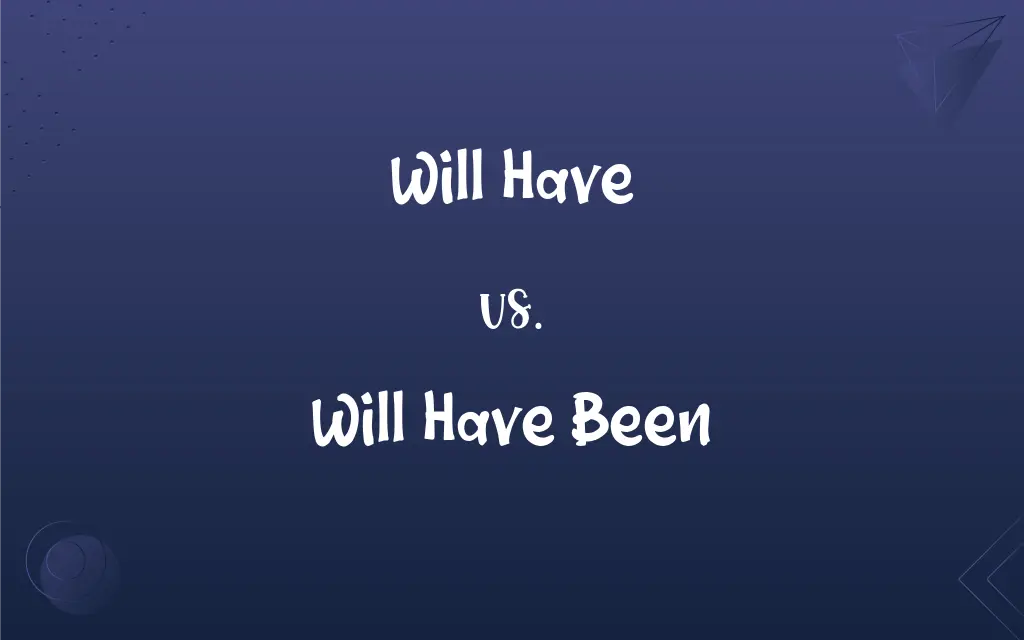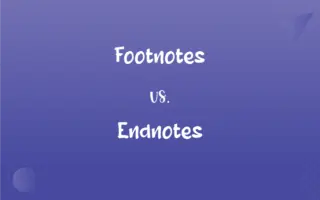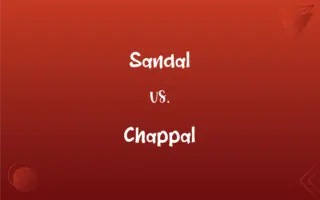Will Have vs. Will Have Been: What's the Difference?
Edited by Janet White || By Harlon Moss || Published on December 24, 2023
"Will have" is used for actions completed by a future point, while "will have been" implies ongoing action up to and possibly beyond that point.

Key Differences
"Will have" is the future perfect tense, used for actions that will be completed before a specified time in the future. "Will have been" is the future perfect continuous tense, emphasizing the duration of an action up to a future point.
"Will have" focuses on the completion of an action, e.g., "By tomorrow, I will have finished the project." "Will have been" emphasizes the ongoing nature, e.g., "By tomorrow, I will have been working on the project for three days."
"Will have" is often used in contexts where the completion of an action is relevant, such as deadlines or milestones. "Will have been" is used when the emphasis is on the process or duration, such as describing experiences or continuous actions.
"Will have" is followed by a past participle, indicating a definite endpoint. "Will have been" is followed by a present participle, indicating continuous action.
Using "will have" can imply certainty about the future, while "will have been" can suggest an ongoing situation that may or may not continue past the referenced time.
ADVERTISEMENT
Comparison Chart
Ense
Future Perfect
Future Perfect Continuous
Focus
Completion of an action
Duration of an action
Example Use
Completion of tasks, deadlines
Duration of experiences, ongoing tasks
Grammatical Structure
Followed by past participle
Followed by present participle
Implication
Certainty of action's completion
Continuity of action up to a point
ADVERTISEMENT
Will Have and Will Have Been Definitions
Will Have
Future completion of action.
By next week, I will have completed the report.
Will Have Been
Ongoing situation until a future time.
They will have been living in Paris for three months by then.
Will Have
Used for future predictions.
They will have arrived by 6 PM.
Will Have Been
Duration up to a future point.
By June, I will have been working here for a year.
Will Have
Indicates the endpoint of a future action.
We will have painted the house by tomorrow.
Will Have Been
Indicates ongoing future events.
We will have been renovating the house for two years by 2024.
Will Have
Expresses future accomplishments.
He will have finished his degree by next year.
Will Have Been
Continuous action up to the future.
She will have been driving for eight hours by midnight.
Will Have
Indicates a future milestone.
She will have turned 18 by the time she starts college.
Will Have Been
Emphasizes the process over time.
He will have been studying for his exams for weeks.
FAQs
Is 'will have been' about ongoing actions?
Yes, it emphasizes the ongoing nature of an action until a future time.
What is 'will have been' used for?
It's used to indicate the duration of an action up to a future point.
Can 'will have' be used for predictions?
Yes, it's often used for making predictions about future completions.
Does 'will have been' imply continuous action?
Yes, it implies that the action is continuous up to a point.
What comes after 'will have been'?
A present participle follows 'will have been'.
What does 'will have' express?
It expresses the completion of an action by a future time.
What follows 'will have'?
A past participle follows 'will have'.
Can 'will have' indicate personal achievements?
Yes, it's often used to talk about future achievements or milestones.
Can 'will have' imply certainty?
Yes, it often implies certainty about future events or actions.
How does 'will have' differ in usage from simple future tense?
It specifies the completion of actions by a certain future time, unlike simple future tense.
Are there any exceptions in using 'will have'?
Its use is fairly straightforward, focusing on future completion.
Is 'will have' used in formal contexts?
Yes, it's commonly used in formal and academic contexts.
Is 'will have been' common in everyday conversation?
It's less common in casual speech but used in specific contexts.
How does 'will have been' affect sentence structure?
It extends the sentence to include duration up to a future point.
What about irregular verbs with 'will have been'?
Irregular verbs follow the same pattern, with appropriate present participles.
Is 'will have been' only used for positive sentences?
No, it can be used in questions and negative sentences as well.
How does 'will have been' reflect on past actions?
It connects past actions or situations to a point in the future.
Can 'will have been' suggest future plans?
Yes, especially regarding plans involving duration or ongoing processes.
Can 'will have' be used in conditional sentences?
Yes, it's used in conditional sentences to talk about future possibilities.
Can 'will have' be used interchangeably with 'will have been'?
No, they have distinct uses based on completion versus duration.
About Author
Written by
Harlon MossHarlon is a seasoned quality moderator and accomplished content writer for Difference Wiki. An alumnus of the prestigious University of California, he earned his degree in Computer Science. Leveraging his academic background, Harlon brings a meticulous and informed perspective to his work, ensuring content accuracy and excellence.
Edited by
Janet WhiteJanet White has been an esteemed writer and blogger for Difference Wiki. Holding a Master's degree in Science and Medical Journalism from the prestigious Boston University, she has consistently demonstrated her expertise and passion for her field. When she's not immersed in her work, Janet relishes her time exercising, delving into a good book, and cherishing moments with friends and family.
































































